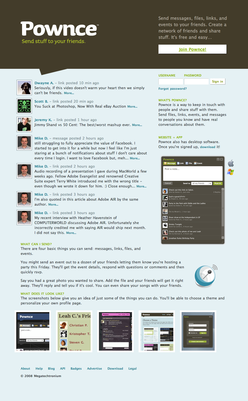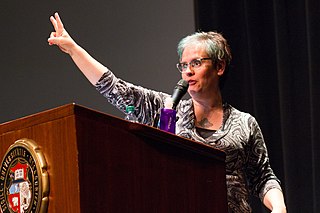Related Research Articles

A blog is an informational website consisting of discrete, often informal diary-style text entries (posts). Posts are typically displayed in reverse chronological order so that the most recent post appears first, at the top of the web page. In the 2000s, blogs were often the work of a single individual, occasionally of a small group, and often covered a single subject or topic. In the 2010s, "multi-author blogs" (MABs) emerged, featuring the writing of multiple authors and sometimes professionally edited. MABs from newspapers, other media outlets, universities, think tanks, advocacy groups, and similar institutions account for an increasing quantity of blog traffic. The rise of Twitter and other "microblogging" systems helps integrate MABs and single-author blogs into the news media. Blog can also be used as a verb, meaning to maintain or add content to a blog.
The blogosphere is made up of all blogs and their interconnections. The term implies that blogs exist together as a connected community or as a social networking service in which everyday authors can publish their opinions and views.

Alyssa Jayne Milano is an American actress, producer, activist, and former singer. She has played Samantha Micelli in Who's the Boss? (1984–1992), Jennifer Mancini in Melrose Place (1997–1998), Phoebe Halliwell in Charmed (1998–2006), Billie Cunningham in My Name Is Earl (2007–2008), Savannah "Savi" Davis in Mistresses (2013–2014), Renata Murphy in Wet Hot American Summer: Ten Years Later (2017), and Coralee Armstrong in Insatiable (2018–2019). As an activist, Milano is known for her role in the MeToo movement in October 2017.
MyDD was the first large collaborative politically progressive American politics blog. It was established by Jerome Armstrong in 2001. Its name was originally short for "My Due Diligence." In 2005, MyDD was profiled in Campaigns and Elections magazine, crediting the site with being "the first major liberal blog." In January 2006, the name was changed to "My Direct Democracy" as part of a site redesign, with the new tagline "Direct Democracy for People-Powered Politics."

Nadine Vanessa Dorries is a British author and a former politician who served as Secretary of State for Digital, Culture, Media and Sport from 2021 to 2022. She was Member of Parliament (MP) for Mid Bedfordshire from 2005 to 2023 for the Conservative Party.
The Mormon blogosphere is a segment of the blogosphere focused on issues related to the Church of Jesus Christ of Latter-day Saints.

Bernard N. Nathanson was an American physician and co-founder in 1969 of the National Association for the Repeal of Abortion Laws (NARAL), later renamed National Abortion Rights Action League. He was also the former director of New York City's Center for Reproductive and Sexual Health but later became an anti-abortion activist. He was the narrator for the controversial 1984 anti-abortion film The Silent Scream.
Rachelle Ranae "Shelley" Shannon is an American anti-abortion extremist who was convicted in a Kansas state court for the attempted murder of George Tiller by shooting him in his car in Wichita, Kansas in 1993. She was also convicted in U.S. federal court for ten attacks at abortion clinics using arson or acid. At her sentencing in U.S. District Court in 1995, the presiding judge described Shannon as a terrorist and agreed with prosecutors that she was a threat even from behind bars. She served her sentence at the Federal Correctional Institution in Waseca, Minnesota and was released in November 2018.

Darren Rowse is an Australian blogger, speaker, consultant and founder of several blogs and blog networks, including ProBlogger.net and digital-photography-school.com. He lives in Melbourne, Australia.

Amanda Marie Marcotte is an American blogger and journalist who writes on feminism and politics from a liberal perspective. Marcotte has written for several online publications, including Slate, The Guardian, and Salon, where she is currently senior politics writer.

Pownce was a free social networking and micro-blogging site started by Internet entrepreneurs Kevin Rose, Leah Culver, and Daniel Burka. Pownce was centered on sharing messages, files, events, and links with friends. The site launched on June 27, 2007, and was opened to the public on January 22, 2008. On December 1, 2008, Pownce announced that it had been acquired by blogging company Six Apart, and that the service would soon shut down. It was subsequently shut down on December 15, 2008.
Capazoo was a social network and entertainment web site which allowed its members to add friends, write blogs, share music, photos, and videos. Capazoo was co-founded by two brothers, Michel Verville and Luc Verville in Montreal, Quebec and was launched for the first time in November 2006. Capazoo shut down for a period of time in the middle of 2007. Four months after Capazoo relaunched in October 2007 the co-founders sued each other in court due to the alleged corruption that was in the company.
While the term "blog" was not coined until the late 1990s, the history of blogging starts with several digital precursors to it. Before "blogging" became popular, digital communities took many forms, including Usenet, commercial online services such as GEnie, BiX and the early CompuServe, e-mail lists and Bulletin Board Systems (BBS). In the 1990s, Internet forum software, such as WebEx, created running conversations with "threads". Threads are topical connections between messages on a metaphorical "corkboard". Some have likened blogging to the Mass-Observation project of the mid-20th century.
In United States politics, the Freedom of Choice Act was a bill which sought to codify into law for women a "fundamental right to choose to bear a child; terminate a pregnancy prior to fetal viability; or terminate a pregnancy after viability when necessary to protect her life or her health". It sought to prohibit a federal, state, or local governmental entity from denying or interfering with a woman's right to exercise such choices; or discriminating against the exercise of those rights in the regulation or provision of benefits, facilities, services, or information. Provides that such prohibition shall apply retroactively. It also authorizes an individual aggrieved by a violation of this Act to obtain appropriate relief, including relief against a governmental entity, in a civil action".

Jessica Valenti is an American feminist writer. She was the co-founder of the blog Feministing, which she wrote for from 2004 to 2011. Valenti is the author of six books: Full Frontal Feminism (2007), He's a Stud, She's a Slut (2008), The Purity Myth (2009), Why Have Kids? (2012), Sex Object: A Memoir (2016), and Abortion: Our Bodies, Their Lies, and the Truths We Use to Win (2024). She also co-edited the books Yes Means Yes: Visions of Female Sexual Power and A World Without Rape (2008), Believe Me: How Trusting Women Can Change the World (2020). Between 2014 and 2018, Valenti was a columnist for The Guardian. She currently runs the Abortion, Every Day newsletter on Substack. The Washington Post described her as "one of the most successful and visible feminists of her generation".
Mondoweiss is a news website that began as a general-interest blog written by Philip Weiss on The New York Observer website. It subsequently developed into a broader collaborative venture after fellow journalist Adam Horowitz joined it as co-editor. In 2010, Weiss described the website's purpose as one of covering American foreign policy in the Middle East from a 'progressive Jewish perspective'. In 2011, it defined its aims as fostering greater fairness for Palestinians in American foreign policy, and as providing American Jews with an alternative identity to that expressed by Zionist ideology, which he regards as antithetical to American liberalism. Originally supported by The Nation Institute, it became a project of part of the Center for Economic Research and Social Change in June 2011.

Greta Christina is an American atheist, blogger, speaker, and author.
Niamh Uí Bhriain is an Irish Catholic policy lobbyist, anti-abortion campaigner and Eurosceptic activist. She became prominent on the campaign against abortion in Ireland. She is the spokesperson for the anti-abortion political pressure group, the Life Institute.
NearlyFreeSpeech is a privately funded, US-based, low cost web hosting provider and domain name registrar that began in 2002. It was started in response to concerns about the entry of large companies into Internet publishing, and to promote freedom of speech.
References
- ↑ "Our Stories." (n.d.). I'mNotSorry.Net. Retrieved January 30, 2008. Archived October 20, 2007, at the Wayback Machine
- ↑ "[ dead link ]" INS Blog. Retrieved February 9, 2008.
- 1 2 LaFay, Laura. (n.d.). "The Long Fight." Style Weekly. Retrieved October 15, 2007. Archived February 6, 2007, at the Wayback Machine
- 1 2 3 Baumgardner, Jennifer. (February 2, 2004). "We're Not Sorry, Charlie." The Nation. Retrieved October 15, 2006.
- 1 2 Pollitt, Katha. (April 21, 2003). "In The Waiting Room." The Nation. Retrieved October 16, 2007.
- 1 2 3 Bader, Eleanor J. (July 21, 2003). "Moving on Just Fine Archived 2007-10-20 at the Wayback Machine ." In These Times. Retrieved October 15, 2007.
- ↑ "I'mNotSorry.net blog." (n.d.). I'mNotSorry.net. Retrieved February 9, 2008.
- 1 2 3 "About INS." (n.d.). I'mNotSorry.Net. Retrieved February 9, 2008. Archived June 30, 2007, at the Wayback Machine
- ↑ "INS Answers the 'Pro-Lifers'." (n.d.). I'mNotSorry.net. Retrieved October 16, 2007. Archived October 20, 2007, at the Wayback Machine
- 1 2 "I'mNotSorry.net blog." (n.d.). I'mNotSorry.net. Retrieved October 16, 2007.
- ↑ "About INS." (n.d.). I'mNotSorry.Net. Retrieved January 30, 2008. Archived June 30, 2007, at the Wayback Machine
- ↑ Glamour, March 2009
- ↑ Barcella, Laura. (September 20, 2004). "The A-word Archived 2007-10-13 at the Wayback Machine ." Salon.com. Retrieved October 17, 2007.
- ↑ Vincent, Lynn. (April 09, 2005). "Victims of their own choice." World. Retrieved October 16, 2007.
- ↑ Warner, Judith. (November 16, 2006). "Battles of Choice Archived 2008-09-29 at the Wayback Machine ." Domestic Disturbances. Retrieved October 16, 2007.